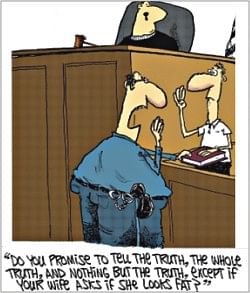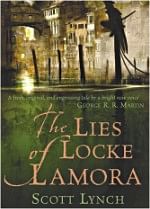 Convince People You're Telling the Truth
Convince People You're Telling the Truth
By Sifana Sohail
Whether you're trying to cover up a lie, fooling around with someone's sense of reality for fun, or getting out of a sticky situation, the one to call on is persuasion. But this persuasion stuff isn't always naturally ingrained in us... it requires a little bit of technique. And here's the rundown on the how to.
Confidence: Hierarchy runs on this stuff. A king who casually orders people's heads cut off like it's completely justified gets his way every time. Uttering the words “I don't know” have rarely gotten people anywhere. All of the well-known rules - eye contact, not fidgeting, not stammering or avoiding the subject - are just ways of projecting confidence. If you want to convince someone that you're telling the truth, you have to be convinced that you're telling the truth. After all, like George Constanza said, “It's not a lie if you believe it's true.” Picture it in your head and pretty soon it'll implant itself like a memory. It's the reason why we have “fake childhood memories.”
 Following through with the memory idea - details are convincing. “I was in the car, coming home from class and I stopped at that cafe in Banani” sounds better than “I was in the car.” Of course, “I was with Mary, who was wearing a red dress with yellow flowers and an empire waist” is probably overkill (unless you're in love with Mary). Also, as with real memories, it's good to have memory gaps. Not “I don't remember” but “Hold on... I think we stopped at that cafe, what was it called again? Something about Mangos - I think Cafe Mango or something.” This one doesn't project confidence, but it can work in certain situations - situations when you feel like you're in the Spanish Inquisition and you need to cool things down.
Following through with the memory idea - details are convincing. “I was in the car, coming home from class and I stopped at that cafe in Banani” sounds better than “I was in the car.” Of course, “I was with Mary, who was wearing a red dress with yellow flowers and an empire waist” is probably overkill (unless you're in love with Mary). Also, as with real memories, it's good to have memory gaps. Not “I don't remember” but “Hold on... I think we stopped at that cafe, what was it called again? Something about Mangos - I think Cafe Mango or something.” This one doesn't project confidence, but it can work in certain situations - situations when you feel like you're in the Spanish Inquisition and you need to cool things down.
It makes sense that if someone already has a firm belief, they won't be willing to listen to what you have to say. Whether they're convinced of your wrong-doing or that their answer in chemistry is correct, the first thing you have to do is shake their belief system. Convince them that you know more about the topic than they do. Once you do that, everything you say will filter into their subconscious. They'll believe you. Solid facts - the names of resources, exact dates (whether true or not) will only emphasise your expertise. Of course, you'd have to be careful with how far you took the fake “facts.” Repetition is the key. All of the heart-warming clichés where the loser girl/guy confesses that they have low self-esteem because it's been drilled into their heads since childhood actually have a very good point. The first time you tell someone something, they won't believe you. But if you continue to repeat it, it'll become planted in their subconscious. This one works great if you try to set people up by telling them that the other person likes them (like we've all seen). They won't believe you until person 1 catches person 2 glancing at them. Voila. The seed of doubt springs to life and does all the persuading. (Yes, it works in real life too.) Nifty, no?
Sadly, there's no shortcut. Persuasion Instant Darkness Powder: Clouds Judgement. Wearing someone down bit by bit, even in one conversation, is a tedious lengthy process. But if you can pull it off... well, practice makes perfect.
 BOOK REVIEW
BOOK REVIEW
The Lies of Locke Lamora
By Scott Lynch
Reviewed by Tareq Adnan
What do you get when you mix a fireman with a wordsmith? You get Scott Lynch. Not only is he manly enough to walk into burning buildings and come out of it with his overlong hair intact, but he manages to quip off colour limericks while rescuing babies. Or at least one imagines that he does, if his books are any indicator of his character and manliness.
And to be honest, that's exactly the draw that makes Lynch's debut book, The Lies of Locke Lamora so appealing. It doesn't pander to the tropes of regular fantasy. It doesn't adhere to the rules of the good and noble hero. Lynch went and wrote a book where the characters are as flawed as they come, mostly because they happen to be self-serving to a T.
 The story focuses on the dark and grimy underworld of Camorr, a city that's divided into islands and is crisscrossed with the canals formed by the estuary it sits on. The city itself can be considered to be a superb character, adding flavour and ambience to the story and leaving an indelible impression in its wake. If anything, Lynch should be commended on his innovative approach to world building. We are introduced at the very beginning to Locke Lamora, a sneak thief who suffers from the curious predicament of “stealing too much”. Lamora is a character who is delightfully deficient of any morals when it comes to self-gain and yet manages to be likeable enough that you become instantly a fan.
The story focuses on the dark and grimy underworld of Camorr, a city that's divided into islands and is crisscrossed with the canals formed by the estuary it sits on. The city itself can be considered to be a superb character, adding flavour and ambience to the story and leaving an indelible impression in its wake. If anything, Lynch should be commended on his innovative approach to world building. We are introduced at the very beginning to Locke Lamora, a sneak thief who suffers from the curious predicament of “stealing too much”. Lamora is a character who is delightfully deficient of any morals when it comes to self-gain and yet manages to be likeable enough that you become instantly a fan.
We see Locke join the Gentleman Bastards, a group of conmen intent on fooling both the nobility and the fraudulent out of their gold and sometimes their tables. Lynch uses the premise of the young thieves being trained in the art of corruption as a way to introduce us to the general storyline and the political and social world at large. Not only that, but by interspersing the 'past' and the 'present', Lynch manages a near metaphorical non-linear arc that constantly teases and surprises the reader.
We are made privy to the Gentlemen Bastards in the present, as young, successful thieves stealing larger and larger amounts from gullible marks. Through them, we see the war broiling in the underworld of Camorr; between Capa Barsavi, the Mafia-esque don, and the Gray King, a pretender to the throne. The reader is also shown the Gentlemen in their formative years and once again the characters are used to show the larger picture of Camorr. The young thieves, fumbling through their steep learning curves, show us how The Secret Peace was set up in Camorr, how the underworld became so pervasive and structured that it worked like clockwork. And once again, we see grown men, including Lamora, witnessing the crumbling of the edifice from very personal standpoints. The story is complex and eventful enough that the review cannot fully offer a gist of it without wilfully spoiling a choice angle. So let's leave it be.
Scott Lynch, as a first time writer exhibits enough charm and poise and that at times one forgets that this is a debut. However, there are reminders here and there that do speak to the author's relative inexperience. The interludes can be - and are sometimes - jarring and there are instances when the transition from one scene to the next is not quite seamless. The speech patterns of the characters, especially amongst the Gentlemen, do tend to veer towards sameness. Even though their sarcastic banter is enjoyable, one does wonder if it isn't just Lynch spewing his own spiel. Near the end of the book, there is a distinct feeling of 'rush', as if Lynch was so excited to bring his brilliant plan to a close and show off the cards he'd dealt, that he forgot to slowly build up to them. But, Lynch can be forgiven, simply because even when he makes mistakes he makes them doing new things. You can't blame a guy for trying. Especially when he's a fireman.
([email protected])
My journey eternal
By Ibrahim
Here I stand at the pinnacle of my private procrastinations.
Shielded from the bulging beauty of the world,
That splendid creature, no Jocasta could dare to assume;
Masked with a patina of transient disguise.
She slowly whispers, her words a loving caress.
Calling me out to the ends of the winds;
The sycamore leaves crack and the juniper serenades
Blind directions to a blinded man.
The insidious mastery of my elusive muse enthrals me,
But the yellow-smoke swirls around me, sweet epiphany,
We will never meet, you and I, and time there will be none
To talk of tea and war in
dusty rooms with dustier souls.
And so I follow a road I hope shall never end,
No chance encounters, no rendezvous I pray,
Until the Redeemer brings silence to my light
And saves me from destroying all I love.
All alone
By Muhaimin Khan
The blissful breeze that blows past by,
Touches her thought and makes her cry.
Those beautiful days will not return.
Only kept safe in memory's urn.
The loss was great that the world can tell
Even the sky, the moon's no well.
No stars can be seen up there,
Only gloomy clouds and her lonely stare.
Where is her Treasure? Her beloved one?
Not here in this world but forever gone.
She walks and cries all alone,
Where blissful moon once shone.
